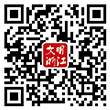諸葛亮、陸游……都給子孫留下了什么家訓(xùn)
南宋以后,20%的家訓(xùn)名篇出自浙江,這些家訓(xùn)的撰寫者都是名臣碩儒。很多家訓(xùn)文獻都是專門寫下來用于訓(xùn)誡家族子弟的傳承性文書,因此,內(nèi)容比較系統(tǒng),主要圍繞修身、治家、處世、教子等幾個大的方面,條分縷析,面面俱到。
中華幾千年的文明能延續(xù)至今,家庭能穩(wěn)定持續(xù)與家庭教育有很大關(guān)系。其中,家訓(xùn)是我國古代家族長輩為教育子孫后代而專門撰寫的文獻。
從周公到孫中山,家訓(xùn)歷時3000多年,繩繩相繼,積累了眾多的家訓(xùn)名篇。不少大型類書里都有收錄:《中國叢書綜錄》收錄了117種,《四庫全書》收錄了171種,《古今圖書集成》收錄了155種。
傳承意義十足的訓(xùn)誡
家訓(xùn)的文獻和載體有四種:一是散見于歷代文獻典籍、人物列傳中的訓(xùn)子文,如《尚書》里的周公訓(xùn)辭、《孔子家語》里的過庭訓(xùn),《宋史》里的包拯家訓(xùn)等;二是歷代文人撰寫的單篇家訓(xùn),如北齊顏之推《顏氏家訓(xùn)》;三是《家譜》中的家訓(xùn)族規(guī);四是歷代詩詞文集中的訓(xùn)子詩。如此,構(gòu)成了一部完整的中國家庭教育思想史。
很多家訓(xùn)文獻都是專門寫下來用于訓(xùn)誡家族子弟的承傳性文書,因此,內(nèi)容比較系統(tǒng),主要圍繞修身、治家、處世、教子等幾個大的方面,條分縷析,面面俱到。比如,孫奇逢的《孝友堂家規(guī)》、司馬光的《家范》,甚至連長幼如何行禮、子孫如何祭祀、墳地的樹如何栽種、來往親戚如何接待等,都一條條地加以明確規(guī)定。有些家箴類家訓(xùn),收集了不少警世哲語,加以編排、分類,對今人仍頗有警策意義。如顏之推的《顏氏家訓(xùn)》,除了教子、治家等內(nèi)容外,還涉及音韻、音樂、風(fēng)俗等內(nèi)容,簡直可以說是一部中國六世紀(jì)時的家教百科全書。
值得一提的是,具有訓(xùn)誡意義的家書是家訓(xùn)文化的重要組成部分。家書因人而異、隨事而寫、有感而發(fā),盡管不很系統(tǒng),但富有情感,語義深長,詞氣真切。今天讀來,仍令人有蕩氣回腸之慨。
在家書中,有的直接點出了訓(xùn)子、誡子的主題,如西漢劉向的《誡子歆書》、東漢鄭玄的《戒子益恩書》、三國劉度的《誡弟緯書》、三國諸葛亮的《誡子書》、南北朝徐勉的《誡子崧書》、唐盧氏的《訓(xùn)子崔玄暉書》,唐柳玳的《戒子弟書》、明徐媛的《訓(xùn)子書》、清紀(jì)昀的《訓(xùn)次兒書》、清曾國藩的《諭子紀(jì)澤書》等。另外一些家書,則是在書信中隱含勸諭訓(xùn)誡之意,如三國虞翻的《與弟書》、唐顏真卿的《與緒汝書》、唐舒元輿的《貽諸弟砥石命》、宋胡安國的《與子書》、明李際陽母的《與子書》、明彭士望的《示兒婿書》、清左宗棠的《致孝威、孝寬》、清張之洞的《與兒書》等。
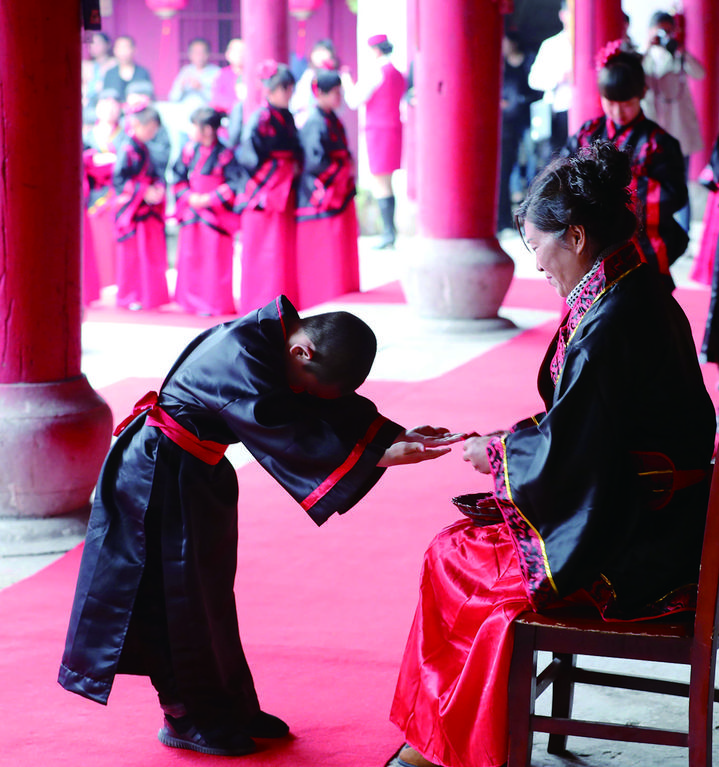
浙江臺州各地的顧氏后人齊聚顧氏祠堂,舉行臺州顧氏家風(fēng)館揭牌儀式和祭祖大典,傳承家風(fēng)家訓(xùn)。
訓(xùn)誡類家訓(xùn)針對的對象,一般是家族的所有子孫后輩,旨在世代遵循,世代承傳。而家書往往是針對某人某事,用拉家常的口吻以事說理。因此,與板起面孔的訓(xùn)誡相比,家書中的那些娓娓道來的長者之言,更富于感染力。家書中不乏文情并茂的動人之句,如諸葛亮的“非淡泊無以明志,非寧靜無以致遠(yuǎn)”;彭端淑的“學(xué)之,則難者亦易矣;不學(xué),則易者亦難矣”;彭士望的“惟勉勉以求益,非汲汲于知名”;紀(jì)昀的“事能知足心常愜,人到無求品自高”;左宗棠的“志患不立,尤患不堅”等,都是家書中的訓(xùn)子名言。
浙江大學(xué)樓含松教授新近編纂出版的《中國歷代家訓(xùn)集成》12冊,全文收錄歷代家訓(xùn)285種,為家訓(xùn)文化的傳承和弘揚做了一大功德。
江浙多有家訓(xùn)名篇
南宋建都杭州以后,政治文化的重心也逐漸南移,江浙地區(qū)也進入了家訓(xùn)文化發(fā)展的繁盛時期。據(jù)統(tǒng)計,南宋以后,20%的家訓(xùn)名篇出自浙江,這些家訓(xùn)的撰寫者都是名臣碩儒。
愛國不渝的放翁家:陸游,浙江紹興人,南宋愛國詩人,一生寫了9300多首詩,其中訓(xùn)子詩有200多首,他還寫了著名的《放翁家訓(xùn)》。
陸游的家訓(xùn)主要包括三方面的內(nèi)容——
一是表達深深的愛國情懷。陸游出生在北宋亡國之際,國恥家恨與生俱來,他的愛國之情,深切入骨,臨終的前一年寫下的《示兒》:“死去元知萬事空,但悲不見九州同。王師北定中原日,家祭無忘告乃翁。”這堪稱是中華民族“第一愛國遺訓(xùn)”。
二是教訓(xùn)晚輩為官清正、造福于民。如《示兒子》:“祿食無功我自知,汝曹何以報明時。為農(nóng)為士亦奚異,事國事親惟不欺。”陸游自愧自己無功受祿,訓(xùn)誡子孫們不論務(wù)農(nóng)還是做官,關(guān)鍵是要為國家、為家庭盡心盡責(zé)。
三是崇尚道德。陸游很重視氣節(jié)教育,在《示兒孫》詩中教訓(xùn)兒輩:“為貧出仕退為農(nóng),二百年來世世同。富貴茍求終近禍,汝曹且勿墜家風(fēng)。”這是告誡子孫們要始終保持氣節(jié),莫戀富貴,不要玷污了清白家風(fēng)。
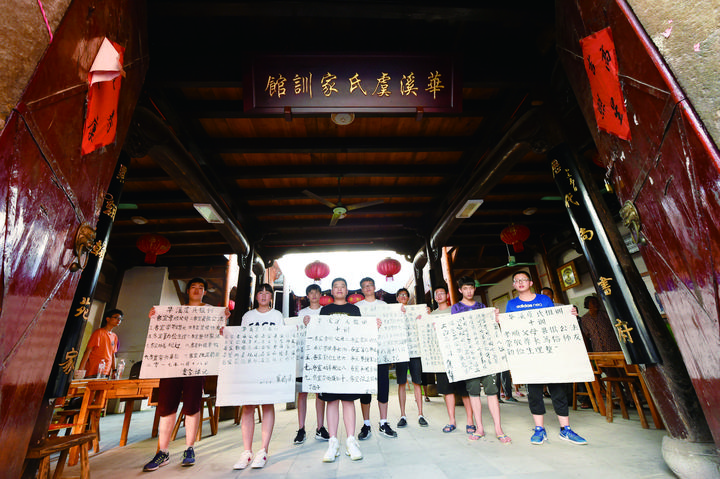
浙江金華舉行賽家訓(xùn)活動,大學(xué)生毛筆手抄村訓(xùn)后進行展示。
寓教于俗的呂家:浙江金華的呂氏家族,素有撰述家訓(xùn)的傳統(tǒng)。早在北宋,仁宗朝宰相呂夷簡就作有家訓(xùn)《門銘》,光祿少卿呂希哲著有《家塾廣記》,呂本中著有《童蒙訓(xùn)》。
呂祖謙,南宋理學(xué)家,與朱熹、張栻并稱“東南三賢”,開創(chuàng)了“婺學(xué)”之先河,推動了南宋學(xué)術(shù)的發(fā)展和繁榮。他集呂氏家訓(xùn)思想之大成,著有《少儀外傳》《家范》《辨志錄》等家訓(xùn)。《宋史》贊之為“居家之政,皆可為后世法”。
講大道理,對三、五歲的小孩不一定有效。呂祖謙就將儒家的倫理思想融入孩童的日常生活進行教育,在《辨志錄》中就舉了幾個很生活化的例子:
“發(fā)人私書,拆人私信,深為不德。”
“凡借人書冊器用,不加愛惜,至有損壞,乃無德之一端也。”
“凡與人坐,夏則己擇涼處,冬則己擇暖處;與人共食,多取先者,皆無德之一端也。”
呂氏家族延續(xù)百年、人才輩出,清代曾出過十七個進士、五個宰相,如此名門望族,與呂氏家族深厚的家學(xué)家風(fēng)有關(guān)。
崇尚儉樸的許家:許汝霖,浙江海寧人,清代康熙朝的著名諫官,官至禮部尚書。他為官清正廉潔,政績卓著,深得康熙皇帝贊賞,曾御賜“清慎勤”匾額。
許汝霖告老還鄉(xiāng)回到老家海寧,便結(jié)合自已的為官經(jīng)歷和處世感悟,寫下了著名的家訓(xùn)《德星堂家訂》,為后代立下規(guī)矩,要求子孫后代在宴賓、著裝、嫁娶、兇喪、祭祀等方面厲行節(jié)儉,所用的魚、肉、雞、鴨等,都用本地生產(chǎn)的平常之品,禁止食用燕窩、魚翅等奢侈品。
許汝霖要求族人凡事一切從簡,以樸為美,這和當(dāng)今提倡的節(jié)儉之風(fēng)異曲同工,許氏家族的后代至今仍傳承樸素節(jié)儉的家風(fēng)。
浙江金華舉行賽家訓(xùn)活動,大學(xué)生毛筆手抄村訓(xùn)后進行展示。
興學(xué)重教的吳家:清代書畫家吳昌碩是浙江安吉人,晚年雖客寓上海,但十分重視后代族人的教育。他曾給自已定下一條規(guī)矩:凡家族中有人生了孩子,他就托人帶回一筆銀兩,設(shè)立教育基金,作為新生孩童以后上學(xué)之用。這個義舉得到族人的積極響應(yīng),他去世后仍代代延續(xù),成了吳氏家族的家規(guī)。
辛亥革命后,推行“廢科舉,興學(xué)堂”新政。1912年春節(jié),吳昌碩回鄉(xiāng)過年,與家鄉(xiāng)父老商定,借吳氏宗祠作為校舍,建立了孝豐縣廣安鄉(xiāng)初等小學(xué)堂,成立了學(xué)堂董事會,他帶頭捐贈了數(shù)百大洋,村中士紳紛紛效仿,集資購置教學(xué)器材、聘請教師,招收學(xué)生。他還倡議將族田作為學(xué)堂的固定資產(chǎn),以維持正常開支,這所學(xué)堂就是今天昌碩小學(xué)的前身。吳昌碩創(chuàng)辦新學(xué)的義舉,至今仍為鄉(xiāng)民所樂道。
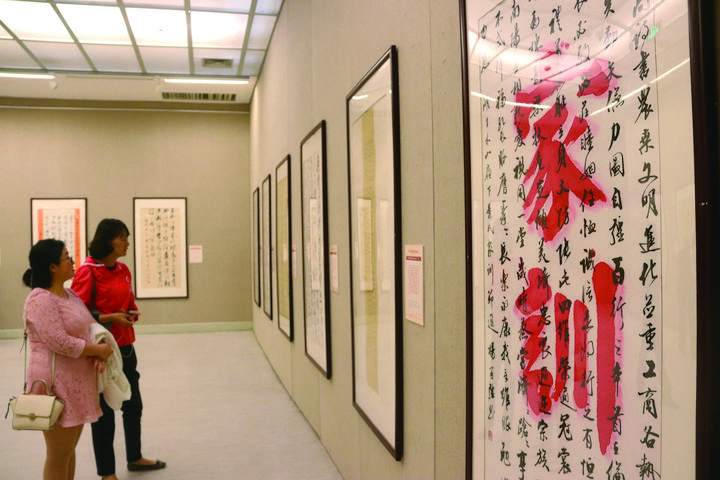
家規(guī)家訓(xùn)書法作品。
情懷家國的錢家:杭州臨安人錢镠是五代十國時期吳越國的創(chuàng)立者。吳越國建都杭州,所轄疆域相當(dāng)于今天的浙江、江蘇蘇州和福建福州。吳越國采取保境安民的治國方針,重農(nóng)桑、興水利、發(fā)展海外貿(mào)易,至公元978年納土歸宋,立國七十二年,使江浙大地獲得了較長的穩(wěn)定發(fā)展機遇期。
錢镠晚年立下了《武肅王八訓(xùn)》和《武肅王遺訓(xùn)》,到了清代成為《錢氏家訓(xùn)》。《錢氏家訓(xùn)》共635字,分“個人、家庭、社會、國家”4篇,以修身、齊家、治國、平天下為訓(xùn)誡要義,對錢氏后人產(chǎn)生了深遠(yuǎn)的影響,形成了“以天下為己任”的家國情懷和優(yōu)良家風(fēng)。
自宋代以后,錢氏家族人才輩出,特別是進入現(xiàn)當(dāng)代,出現(xiàn)了眾多著名的政治家、科學(xué)家、學(xué)者,有人把它概括為“一諾獎、二外交家、三科學(xué)家、四國學(xué)大師、五全國政協(xié)副主席、十八兩院院士”,堪稱“千古一族”。
錢氏家族傳世數(shù)十代,經(jīng)久不衰,英才迭出,究其原因,正如錢偉長先生說的,錢氏家族有《錢氏家訓(xùn)》的指引,重視家教,族人后裔得益很大。
耕讀傳家的諸葛家:諸葛亮的《誡子書》以“淡泊明志”“靜以修身,儉以養(yǎng)德”聞名于世。浙江省蘭溪市的諸葛八卦村,是江南諸葛亮后裔的最大聚居地。整個村落建筑格局按“八陣圖”樣式布列,且保存了大量明清古民居,是著名文化古村落。據(jù)傳,諸葛亮曾立下“不為良相,便為良醫(yī)”的祖訓(xùn),告誡后人:如果成不了輔助國君治理國家的忠臣良相,就種種草藥學(xué)學(xué)中醫(yī),做一個為民解除病痛的良醫(yī)吧。諸葛村的后人們牢記祖訓(xùn),耕讀并重,人才輩出。如今,中醫(yī)中藥仍是諸葛八卦村的特色傳統(tǒng)產(chǎn)業(yè)。
(本文圖片提供:CFP)
Family Mottos Abundant in Zhejiang
One secret of the longevity of Chinese civilization is the stability of families, according to some scholars. And family stability, in the opinion of many scholars, is ascribed to the family tradition maintained in the family mottos written by elders in families and clans in ancient China. The first family motto can be traced to Duke Zhou over three thousand years ago.
Ancient Chinese literature keeps over 100 well known family mottos. They are essentially preserved in four forms: some come down in history in classical documents such as The Book of Documents (first written in over 2,500 years ago) and The History of the Song (a collection of 496 volumes in about 5 million words finished in October, 1345); some appear in long and stand-alone family motto essays; some are documented in family genealogies and clan records; and some were written into poems and have survived in poetry collections. It is said that all these family mottos from the four sources constitute an encyclopedia of family mottos in China.
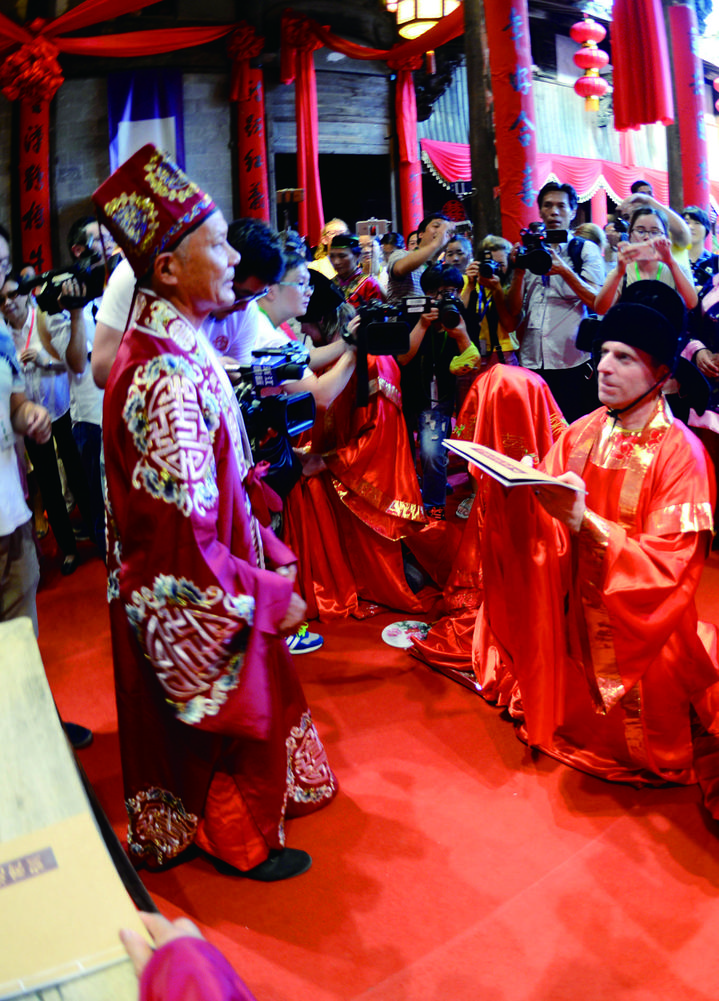
海外學(xué)子走進金華武義古村舉辦傳統(tǒng)婚禮。
Family mottos focus largely on important issues. These mottos set up principles concerning how to improve oneself, how to manage family affairs and what family priorities are, how to behave in society and handle human relations, how to give a moral education to children and maintain value, virtue, and etiquette, etc.
Admonitions for the Yan Clan, a book by Yan Zhitui who lived in the sixth century, is widely considered a mini encyclopedia of family mottos in Chinese history. The contents include not only mottos on how to educate children and how to manage family affairs but also instructions concerning music, phonology, and customs.
Professor Han Song of Zhejiang University has just published a 12-book collection of ancient family mottos in China, presenting the full texts of 285 family mottos of the past.
Zhejiang contributes 20 percent of the family mottos in the collection as of the Southern Song (1127-1279), a dynasty set up by the royal house which fled from the north. Zhejiang experienced booming development and became the political, economic and cultural center of the dynasty as present-day Hangzhou served as the imperial capital. Prominent families and important people emerged. Some of them produced family mottoes that go down in history. Lu You (1125-1210), one of the finest poets of the Southern Song, wrote 9,300 poems in his lifetime, over 200 of which were written for his children. In a famous short poem, the poet, knowing he would not live to see the day, instructed his sons to hold a family sacrificial ceremony and send him in the other world a victory message when the emperor’s army recovered the lost land in the central plain.
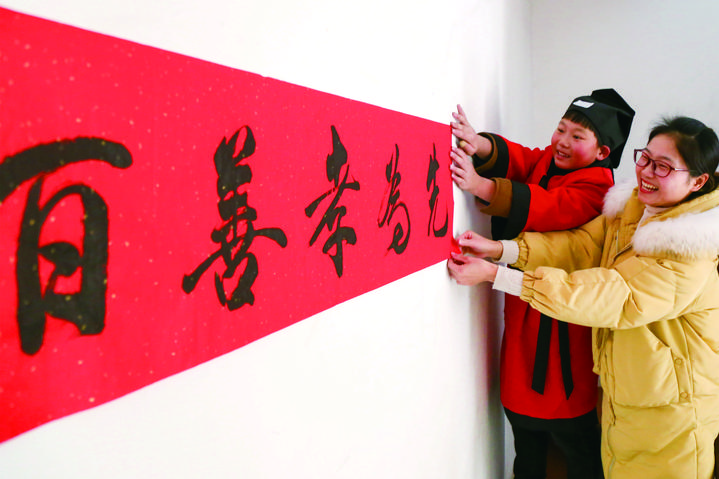
浙江義烏一名小學(xué)生和家長一起把家訓(xùn)張貼上墻。
Another big family in Zhejiang was the Lyu clan. Lyu Zuqian (1137-1181), one of the “three great scholars in the southeast” and a prominent figure of a Confucian school of idealist philosophy in the Southern Song, carried on the family mottos from his forefathers and wrote a few essays presenting a long list of dos and don’ts in teaching virtues and values and etiquettes. Aware that youngsters might not understand abstract concepts, Lyu favored detailed instructions. He advised children not to open other people’s letters and asked them to take extreme care of books they borrowed. The prominence of the family lasted for hundreds of years. In the Qing Dynasty (1644-1911) alone, the Lyu clan produced seventeen scholars who won the top Jinshi degree from imperial examinations) and five prime ministers.
Qian Liu, the founder of the Wuyue Kingdom (907-978) with Hangzhou as its capital, bequeathed his descendents with two family mottos, which evolved into The Mottos of the Qian Clan in the Qing Dynasty. The 635-word text focuses on how to improve oneself, how to manage family priorities, how to be a good and honest government official and how to bring peace and prosperity to the nation. In the 20th century alone, the clan produced a galaxy of outstanding personages: a Nobel Prize laureate, two diplomats, three scientists, four masters of national classics, five vice chairpersons of Chinese People’s Political Consultative Committee, eighteen members of China Academy of Sciences and China Academy of Engineering. Qian Weichang (1912-2010), a scientist of mechanics and mathematics, attributed the success of the Qian Family to the 635-word motto.
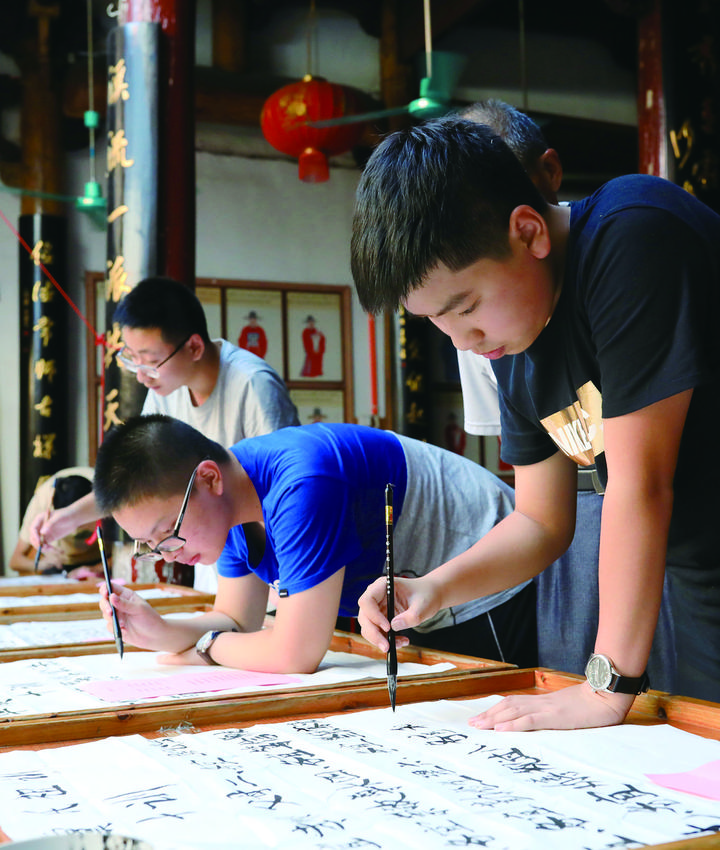
浙江義烏華溪村在虞氏家訓(xùn)館舉行學(xué)子抄家訓(xùn)活動。
Zhuge Eight-Diagram Village in Lanxi, Zhejiang is a settlement named after Zhuge Liang, prime minister of the Su Kingdom of the Three Kingdoms period (220-280). Most of the villagers there are descendents of the prime minister and the village is the largest community of the Zhuge descendents in this part of China. Zhuge Liang is famed also for an essay of advices to his children. The village presents a layout patterned after eight diagrams and is now a tourist attraction as quite a few homes built in hundreds of years ago in the Ming and the Qing still stand as a labyrinth where one could easily get lost. Medical herbs are a key pillar of the village’s economy, for the descendents followed the prime minister’s instruction literarily: if you can’t be a prime minister who takes care of state affairs, you can be a fine medical doctor who saves lives and cures people of diseases.
